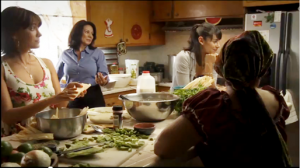By Larissa Puro

In this screen capture from the short film Tamale Lesson, the fictional Romeo family discusses cervical cancer screening while making tamales for a Quinceanera.
The USC faculty-produced short film Tamale Lesson, which uses narrative storytelling to educate women about cervical cancer screening, received the 2013 APHA Public Health Education & Health Promotion Award for best multimedia material from the American Public Health Association at its annual meeting Nov. 2-6 in Boston.
Cervical cancer is largely preventable and treatable. However, some populations — Latina and Korean women, especially — are not adequately screened, which leads to disproportionately high rates of the disease among them.
Aiming to transform the way cancer information is delivered to the public, Lourdes Baezconde-Garbanati, PhD, associate professor of preventive medicine at the Keck School of Medicine of USC, and colleague Sheila Murphy, PhD, associate professor at the USC Annenberg School for Communication & Journalism, spearheaded the Tamale Lesson project after receiving a National Cancer Institute research grant (ICA144052) in 2010.
In the film, the fictional Romeo family is preparing for the youngest daughter’s quinceanera, or 15th birthday. Woven into the characters’ narrative are essential facts regarding the cause of cervical cancer, as well as how to prevent it with the HPV vaccine and detect it through Pap tests.
USC School of Cinematic Arts professors Doe Mayer, MA, and Dave O’Brien, as well as Jeremy Kagan, founder of the USC The Change Making Media Lab, produced the film. Josefina Lopez wrote the script based on focus group work originally funded by the USC Norris Comprehensive Cancer Center.
The researchers tested the film’s scientific effectiveness against the fact-based, non-narrative piece, It’s Time, in a randomized telephone trial among 1,000 Los Angeles women. Results showed Tamale Lesson to be highly effective in changing knowledge, attitudes and cancer screening behaviors.
Having proved that a narrative can be a powerful tool in correcting health disparities in cancer screening, the project’s multidisciplinary team of researchers, artists and experts is moving forward with a Spanish version of the film, which is currently being tested with funding from the Southern California Clinical and Translational Science Institute.

